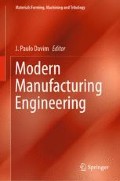Abstract
Manufacturing of parts and products regardless of their shape, geometric features and materials involves a series of processes and operations. Nowadays, it is broadly recognized through the industrial sectors that many manufacturing techniques which are currently implemented in fabricating products lead to production of industrial waste. Lean manufacturing (LM) is a business template that has philosophies designed to eliminate waste in the manufacturing process. The Lean philosophies target activities that absorb resources but create no value and aim to eliminate them. This chapter describes the lean manufacturing as a fairly new concept in industry. The origin and historical background of lean manufacturing as well as the different sources of waste in manufacturing systems are thoroughly explained. In addition, different methods of preventing or eliminating wastes are also discussed. By reviewing a broad range of available academic resources, this chapter mainly aims to provide a strong and thorough understanding of lean manufacturing and its importance in the modern industry.
Access this chapter
Tax calculation will be finalised at checkout
Purchases are for personal use only
References
Womack JP, Jones DT, Roos D (2008) The machine that changed the world. Simon and Schuster
Moore R (2011) Selecting the right manufacturing improvement tools: what tool? when?. Butterworth-Heinemann
Plenert G (2010) Reinventing lean: introducing lean management into the supply chain. Butterworth-Heinemann
Hobbs DP (2004) Lean manufacturing implementation: a complete execution manual for any size manufacturer. J. Ross Pub
Sward K (1948) The legend of henry ford. Rinehart
Alizon F, Shooter SB, Simpson TW (2009) Henry ford and the model T: lessons for product platforming and mass customization. Des Stud 30(5):588–605
Sabel C, Zeitlin J (1985) Historical alternatives to mass production: politics, markets and technology in nineteenth-century industrialization. Past Present. p 133–176
Sloan AP (1964) My years with general motors. Broadway Business
Zhang W (2010) Intelligent energy field manufacturing: interdisciplinary process innovations. CRC Press
History of Toyota (2015). Available from: http://www.toyota-global.com/company/history_of_toyota/1867–1939.html
Womack JP, Jones DT (2010) Lean thinking: banish waste and create wealth in your corporation. Simon and Schuster
Melton T (2005) The benefits of lean manufacturing: what lean thinking has to offer the process industries. Chem Eng Res Des 83(6):662–673
Imai M (1986) The key to Japan’s competitive success. McGrow-Hill/Irwin
Mi Dahlgaard-Park S, Dahlgaard JJ, Mi Dahlgaard-Park S (2006) Lean production, six sigma quality, TQM and company culture. The TQM mag 18(3):263–281
Sugimori Y et al (1977) Toyota production system and kanban system materialization of just-in-time and respect-for-human system. Int J Prod Res 15(6):553–564
Krajewski LJ et al (1987) Kanban, MRP, and shaping the manufacturing environment. Manage Sci 33(1):39–57
Gaspersz V, Fontana A (2007) Lean six sigma for manufacturing and service industries. PT Gramedia Pustaka Utama, Jakarta
Byrne G, Lubowe D, Blitz A (2007) Using a lean six sigma approach to drive innovation. Strategy Leadersh 35(2):5–10
Raisinghani MS et al (2005) Six sigma: concepts, tools, and applications. Ind Manage Data Syst 105(4):491–505
García-Alcaraz JL, Maldonado-Macías AA, Cortes-Robles G (2014) Lean manufacturing in the developing world
Dorota Rymaszewska A (2014) The challenges of lean manufacturing implementation in SMEs. Benchmarking: Int J 21(6):987–1002
Cheng T, Podolsky S (1996) Just-in-time manufacturing: an introduction. Springer Science and Business Media
Monden Y (2011) Toyota production system: an integrated approach to just-in-time. CRC Press
MS Campos L (2013) Lean manufacturing and Six Sigma based on Brazilian model PNQ An integrated management tool. Int J Lean Six Sigma 4(4):355–369
McCullen P, Towill D (2001) Achieving lean supply through agile manufacturing. Int Manuf Syst 12(7):524–533
Cassell C, Worley J, Doolen T (2006) The role of communication and management support in a lean manufacturing implementation. Manag Decis 44(2):228–245
Leite HR, Vieira GE (2015) Lean philosophy and its applications in the service industry: a review of the current knowledge. Production, (AHEAD): p 00–00
Keitany P, Riwo-Abudho M (2014) Effects of lean production on organizational performance: a case study of flour producing company in kenya. Eur J Logistics Purchasing Supply Chain Mgmt 2(2):1–14
Soriano-Meier H, Forrester PL (2002) A model for evaluating the degree of leanness of manufacturing firms. Integr Manuf Syst 13(2):104–109
Author information
Authors and Affiliations
Corresponding author
Editor information
Editors and Affiliations
Rights and permissions
Copyright information
© 2015 Springer International Publishing Switzerland
About this chapter
Cite this chapter
Hosseini, A., Kishawy, H.A., Hussein, H.M. (2015). Lean Manufacturing. In: Davim, J.P. (eds) Modern Manufacturing Engineering. Materials Forming, Machining and Tribology. Springer, Cham. https://doi.org/10.1007/978-3-319-20152-8_8
Download citation
DOI: https://doi.org/10.1007/978-3-319-20152-8_8
Publisher Name: Springer, Cham
Print ISBN: 978-3-319-20151-1
Online ISBN: 978-3-319-20152-8
eBook Packages: EngineeringEngineering (R0)

